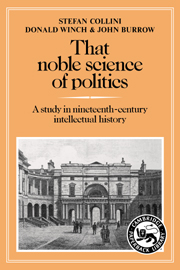Book contents
- Frontmatter
- Contents
- Preface
- PROLOGUE: The governing science: things political and the intellectual historian
- I The system of the North: Dugald Stewart and his pupils
- II Higher maxims: happiness versus wealth in Malthus and Ricardo
- III The cause of good government: Philosophic Whigs versus Philosophic Radicals
- IV The tendencies of things: John Stuart Mill and the philosophic method
- V Sense and circumstances: Bagehot and the nature of political understanding
- VI All that glitters: political science and the lessons of history
- VII The clue to the maze: the appeal of the Comparative Method
- VIII Particular polities: political economy and the historical method
- IX The ordinary experience of civilised life: Sidgwick and the method of reflective analysis
- X A separate science: polity and society in Marshall's economics
- XI A place in the syllabus: political science at Cambridge
- EPILOGUE: A nebulous province: the science of politics in the early twentieth century
- Index
IV - The tendencies of things: John Stuart Mill and the philosophic method
Published online by Cambridge University Press: 17 September 2009
- Frontmatter
- Contents
- Preface
- PROLOGUE: The governing science: things political and the intellectual historian
- I The system of the North: Dugald Stewart and his pupils
- II Higher maxims: happiness versus wealth in Malthus and Ricardo
- III The cause of good government: Philosophic Whigs versus Philosophic Radicals
- IV The tendencies of things: John Stuart Mill and the philosophic method
- V Sense and circumstances: Bagehot and the nature of political understanding
- VI All that glitters: political science and the lessons of history
- VII The clue to the maze: the appeal of the Comparative Method
- VIII Particular polities: political economy and the historical method
- IX The ordinary experience of civilised life: Sidgwick and the method of reflective analysis
- X A separate science: polity and society in Marshall's economics
- XI A place in the syllabus: political science at Cambridge
- EPILOGUE: A nebulous province: the science of politics in the early twentieth century
- Index
Summary
There can be no separate Science of Government; that being the fact which, of all others, is most mixed up, both as cause and effect, with the qualities of the particular people or of the particular age. All questions respecting the tendencies of forms of government must stand part of the general science of society, not of any separate branch of it.
john stuart mill, A System of Logic (1843)All true political science is, in one sense of the phrase, a priori, being deduced from the tendencies of things, tendencies known either through our general experience of human nature, or as the result of an analysis of the course of history, considered as a progressive evolution.
john stuart mill, An Inaugural Address to the University of St Andrew's (1867)any doubts which may reasonably be entertained about the propriety of John Stuart Mill's inclusion in a book on nineteenth-century conceptions of the science of politics may well be reinforced by reflection on the passage from which our first epigraph is taken. Written, with calculated force, by the son of the author of the Essay on Government, it may seem to be announcing the closure of the old family business, and to be asking that all future enquiries be directed to the Head Office of the new sociology group responsible for the take-over.
- Type
- Chapter
- Information
- That Noble Science of PoliticsA Study in Nineteenth-Century Intellectual History, pp. 127 - 160Publisher: Cambridge University PressPrint publication year: 1983



